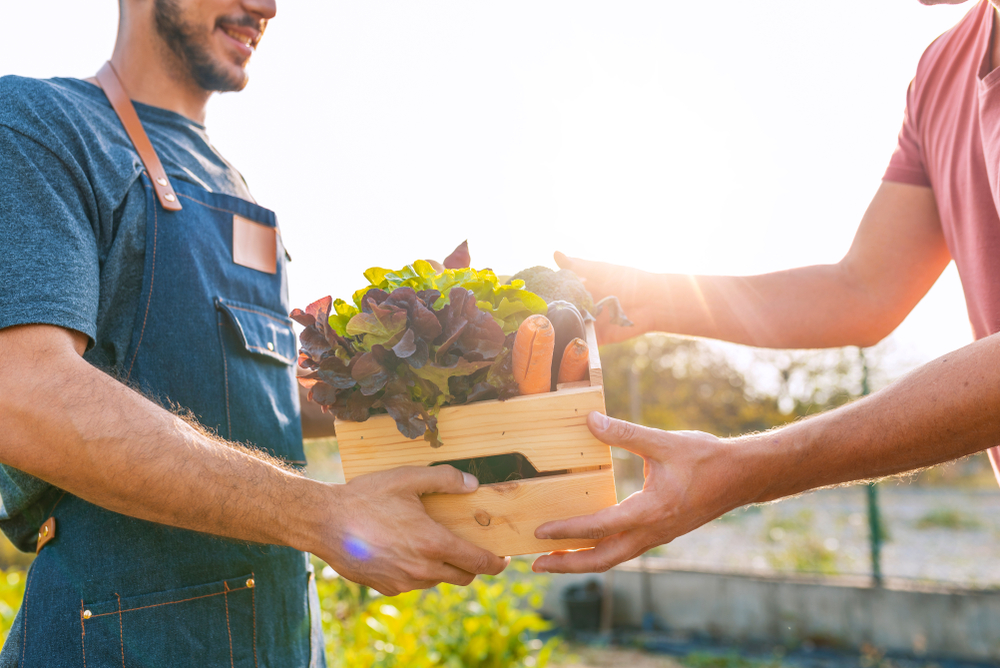The Free Market Opens Doors to Local Food
Joel Salatin|February 9, 2021

An urban exodus is in full swing right now.
Last week, I took yet another urbanite around our area to look at four farm properties for sale.
Why here?
Because she thinks our farm will survive as well as any and wants to be close to it.
In the last couple of years, I’ve helped several people procure properties within half an hour from our farm for the same reason.
Every nonindustrial farmer I know across the country is having the same experience.
In unsettled times, people look for moorings. We all want a dock… a safe place in a time of storm.
But not everyone can pack up and move to the country. (And only so many properties come up for sale.)
And while the coronavirus exposed weakness in our food system… it also revealed something far greater…
That it’s possible to stay connected to a vibrant food culture no matter where you live… thanks to the free market.
Empty Shelves
Over the last 40 years, the food chain has evolved in remarkable ways.
Prior to the 1940s, supermarkets did not exist. The corner grocer carried a handful of staples that folks could purchase to supplement their gardens and neighbors’ food commerce.
Gradually more and more variety showed up in the grocery store. Eventually it morphed into the modern supermarket.
For most folks in America, the thought of getting food from anywhere except a supermarket never enters their minds.
I deal with this all the time when I’m a guest on podcasts. “So where does a person get integrity in food?” the host asks, echoing the most common assumption that if it’s not on the shelf at the supermarket, it doesn’t exist.
When the shelves went empty in April last year, people nearly panicked. We saw them come into our farm store. We saw them suddenly ordering from our online store, Polyface Yum.
We literally ran through a six-month inventory in about four weeks.
Since that time, we’ve seen countless calls for building connections to farmers… getting connected to local food systems.
What is most interesting about this recent development is that 40 years ago, it would have been virtually impossible for our farm to supplement buyers when the supermarkets couldn’t.
Eroding Advantage
Shipping food was far too expensive. Maintaining temperature on frozen items would have been impossible. Even if it were possible, it would have been prohibitively expensive.
It’s one thing for a consumer to pay double or triple the supermarket price… but quite another to pay 10 times.
But now the efficiency edge enjoyed by supermarkets over every other type of retail food interchange has eroded… thanks to rising brick-and-mortar costs and decreasing shipping costs.
For branded-product farms like mine, the supermarket model excluded all small players. I couldn’t even talk to a person on the phone at these large supermarket outfits.
But as shipping logistics became more efficient, it enabled an individual farm like ours to access the marketplace.
A Wide-Open Market
Nothing has democratized food access and food choice more than distribution efficiencies spurred by the demands of the free market.
Finally, the market that was denied to farmers like us (remember, if it’s not at the supermarket, it doesn’t exist) is wide open and even competitively priced with doorstep delivery.
I can raise a pig and put sausage from that pig in a space-age container with dry ice, pack it on our farm, and watch the UPS truck come in and pick up the box.
How does he know when to come and where to go? Because we have a nifty gizmo hooked directly into the UPS shipping system that automatically spits out a shipping label. We weigh the box, punch the numbers into the gizmo… and out comes a label with all the information.
That information goes out to the drivers, and they know to pick up 40 boxes at Polyface before returning to their dock.
It’s incredibly efficient…
And it allows folks to connect to our farm from a thousand miles away with a computer or smartphone… yet have a far more intimate experience with us than at brick-and-mortar grocery store.
That is the ultimate in democratized access and offers wonderful opportunities for folks stuck in the urban malaise.
This level of intimate connection, of close chain of custody, has never before been possible across long distances.
But here we are, just in time.
Have your food shopping habits changed over the past year? Tell us about it at mailbag@manwardpress.com.

Joel Salatin
Joel Salatin calls himself a Christian libertarian environmentalist capitalist lunatic farmer. Others who like him call him the most famous farmer in the world, the high priest of the pasture, and the most eclectic thinker from Virginia since Thomas Jefferson. Those who don’t like him call him a bioterrorist, Typhoid Mary, a charlatan, and a starvation advocate. With a room full of debate trophies from high school and college days, 12 published books, and a thriving multigenerational family farm, he draws on a lifetime of food, farming and fantasy to entertain and inspire audiences around the world.



